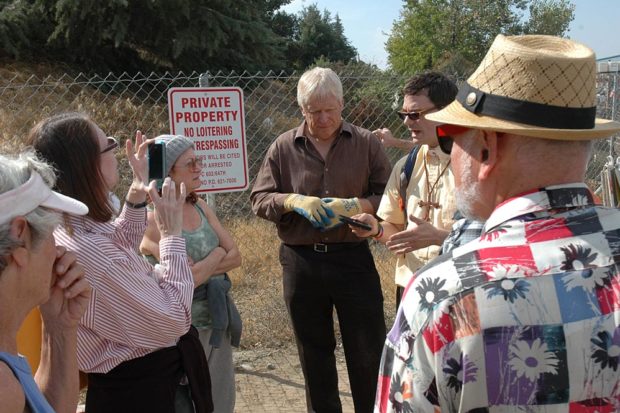
By Chris Breedlove

On Oct. 23, the City of Fresno had all contingencies methodically calculated out for its systematic destruction of the Silo Grain homeless community. Homeless advocates were also there early in the morning and throughout the bitter end. At first, advocates blocked both roadway entrances into the community as Jim Betts, an attorney for Fresno, accompanied by Sgt. Robert Dewy (badge #S175), began to determinedly move on foot throughout the home bases of residents removing structures by hand and bagging personal items of residents. I asked one resident, Nancy, if she was okay with what was happening to her as Dewy and Betts bagged her belongings, and in a broken and shaken voice she trembled, “No, I am not.”
As city workers increasingly moved through the community on foot, it became increasingly difficult for advocates to maintain their posts and merely stand by and witness city workers uproot residents’ shelters and belongings. Advocates also moved into the community to help residents and critically observe city workers. It seemed as a moment was lost by advocates that were outflanked by the City of Fresno. As advocates vacated the entrances, larger city equipment was moved quickly into the community.
Advocates, outnumbered by the city, were struggling with what best to do for community residents. Then suddenly, an opportunity to buy residents more time and a moment of dignity was at hand. Bulldozers, not yet in the community, were staged in waiting at one entrance. Thinking on their feet, advocates decided to block the bulldozers ready to move through the one open entrance as a municipal waste/storage container was largely blocking the only other entrance. Advocates negotiated with Betts to allow a privately rented U-Haul through for residents to gather and store personal property, property that residents did not trust that the city would adequately treat with care.
As advocates stared down a bulldozer and compelled its driver to back up and let the U-Haul through, I asked a nearby Fresno PD “homeless task force” officer for his name and credentials; he looked on in silence and refused to answer. I recorded the episode. Eventually, as bulldozers made their way into the community and idled awaiting Betts’ instruction, another advocate coolly sat on top of its lowered claw preventing it from proceeding, thus buying residents a little more precious time.

It was only a few weeks earlier that I meandered along the railroad tracks following a puppy bouncing at play. The wind was gusty and blowing across the valley’s flat floor. I made my way between the tracks and past the canal’s concrete banks. There in the shadows of an old towering grain silo I met several people. Some were younger than me. Some were older. They all were in the shadows trying to survive.
As I talked with Cinnamon, I paused every once in a while to scoop up an old tennis ball that the puppy would eagerly lay at my feet. I’d toss the ball, and return to listening to Cinnamon as she painfully explained how easily hope could slip out of reach. I asked her and others what they planned on doing when the City of Fresno comes to sweep away their home bases and community.
Rev. Martin Luther King, Jr., took on injustices through acts of nonviolent civil disobedience. One function of nonviolent civil disobedience is to shame the powers that be into doing the right thing. Regretfully though, it seems that those in power are not easily ashamed by their destructive actions.
When I tell my mother about how the City of Fresno is systematically destroying homeless encampments, she quickly recalls her own personal experience of homelessness. For about a year, my mother was homeless in Fort Worth, Texas. My mother is not a drug addict. She does not have a criminal record. At the time, I was unable to relocate her to live with me because she was dependent on essential medical services that were not available where I was living in rural Indiana.
Like many homeless, my mother found friendly help within an encampment. In her encampment, there was a precious sense of community where friends looked out for one another. Her encampment was not ideal, but she felt safer around neighbors of her own choosing. She did spend time in shelters, but she was not always safe in such confines. Like the encampments of Fresno, my mother too faced routine destruction of her homeless communities. While my mother’s status has changed from homeless to sheltered, she nevertheless remains on the margins of society and still frighteningly close to the brink of homelessness.
The City of Fresno spins a PR narrative that encampments have to be destroyed because fires and crimes are pervasive within their ranks. The city narrative of encampments plays in to the unfair generalization that all homeless persons are criminals and drug addicts, or simply individuals not taking responsibility. The real story is that there are a number of complex reasons for the societal existence of homelessness.
Mayor Swearengin and City Manager Bruce Rudd only exacerbate the lives of the homeless by demolishing their communities. Some within the religious fabric of Fresno believe that homeless advocates should collaborate with the city toward solutions. I’m of the mindset that it’s difficult to collaborate with an administration that sends bulldozers and intimidating task forces barreling down on a person that you’re trying to help. The City of Fresno first needs to halt harmful and costly policies toward the homeless.

Homelessness for Swearengin is an unsavory obstacle the thwarts her ambitions for a revitalized downtown that caters to corporate commerce and venture capitalists. Swearengin’s real homeless policy is to keep the homeless out of sight and out of mind. Otherwise, why would she make hard lives harder?
The city often invokes the promise of housing vouchers. The truth of the matter is much more complicated. In fact, most recently, both the Housing Authority and certain City Council members were unaware of the city’s slated destruction of the Grain Silo encampment. Encampment residents also explain how impossibly hard it is to actually receive housing.
The Housing Authority has two lists of persons seeking housing, a waiting list and a preliminary waiting list. The preliminary waiting list, as of this summer, included more than 50,000 names. The actual waiting list is compiled of names pulled out of the preliminary list by a lottery system. It’s easily conceivable how individuals lose hope while lost within such a system.
Fresno is spending tens of thousands of dollars destroying the last efforts of vulnerable people trying to survive harsh realities of an overly impoverished region. Fresno is a place where a quarter of its population exists below the national poverty line. The City of Fresno previously destroyed encampments in 2005 and 2011. One would think that even fiscal hawks would readily see the foolish management of taxpayer dollars, nearly a quarter of a million dollars, to destroy encampments. Rather, Fresno needs to work with the homeless and advocates toward safe and legal campgrounds. As the city deploys bulldozers and dump trucks aimed at homeless communities tucked away in the shadows, one is left to ask Swearengin and Rudd, “if not here, where?”
The homeless now are wandering on foot and warned not to stay in one place for consecutive nights. However, they are not aimless; many have decided to move northward. Some are finding cover along the San Joaquin River, and others are scattering into residential neighborhoods. In the last bit of debris to be scooped up by a bulldozer was an NIV Bible, spread out scripture down on the ground, the Bible cover entitled, “Hope.”
*****

